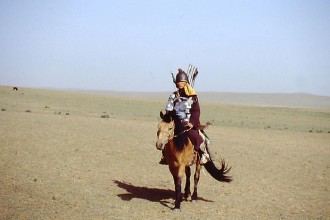It’s one of greatest literary mysteries of all time: who wrote Shakespeare’s plays? And there really is a mystery. How could the Stratford grammar-school boy, son of a glove-maker, become the universal genius who wrote the greatest plays of all time? Why do we know nothing of Shakespeare’s life for the ten years after he left rural Stratford, until he appears in the London theatre world? Why does no-one write about him, as a playwright, during his lifetime?
And why would the real playwright not want to be acknowledged? Well, for one thing, these were extremely dangerous times when the wrong political or religious allegiance could cost you your life. You might not want to have the high profile of London’s leading playwright.
Details:
ZDF, 2011
Length: 42/52 minutes
Directed by: Eike Schmitz
Story by: Susanne Utzt, Eike Schmitz
Camera: Lars Barthel, Alexander Sass
Costumes: Alison Mitchell, Glenda Sharp
Make-up artist: Brenda Leedham
Editor: Mathieu Honoré
Producer: Eike Schmitz
Production assistants: Stephanie Schnabel, Anne Marie Sackx
Music: Brynmor Jones
Sound design & mix: Sebastian Reuter
Narrator: Chris Eldon Lee
Advisers: Giles Milton, Prof. Bastian Conrad
Commissioning editor: Hans-Christian Huf
German or English version
No wonder amateurs and scholars have spent 200 years speculating and investigating whether the real author of Shakespeare’s plays was another, ‘better qualified’ writer. At the last count there were over fifty candidates for the post, many of the them aristocrats, most of them better educated, more travelled and better-connected than the Bard of Stratford.
The most intriguing of all is Shakespeare’s immediate predecessor as lion of the stage: Christopher Marlowe. The author of “Dr. Faustus” and “Tamburlaine the Great” revolutionized English drama, and paved the way for Shakespeare. University-educated diplomat, spy, criminal and young man about town, he lived the international plots and intrigue a provincial grammar-school graduate like William Shakespeare could only have imagined – yet they became the themes of Shakespeare’s dramas.
And Shakespeare’s first plays weren’t performed until after Marlowe’s early death in 1593 at the age of 29 in a sordid pub brawl in Deptford, by the River Thames, East of London.
Until now this has seemed to rule out Marlowe as a candidate for the writer of Romeo and Juliet, Macbeth, Hamlet and King Lear. But in this new documentary, biography and history specialists explore a fascinating and revolutionary thesis: Christopher Marlowe faked his own death to avoid arrest and possible execution by Elizabeth I’s ministers. This freed him to devote his life to literature, using actor-manager William Shakespeare as his straw man – drawing on his own life’s experiences for at least some of his subject matter!











